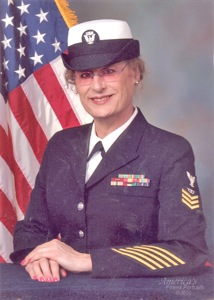feature
My DADT story as a closeted transgender woman
Published Thursday, 30-Sep-2010 in issue 1188
Back in the summer of 1980, I joined the US Navy. The country was in the midst of a nationwide recession and I lied about my personal history of teen cross-dressing.
I signed up for the Advanced Electronics Program, and once in the Navy, I was assigned to the Fire Control Technician (Missiles) rating. The rating title later reverted back to the historic name “Fire Controlman,” so my rating title changed to Fire Controlman in 1984. I first trained to work on the Mark 92 Gun and Missile Fire Control System, which were only on Guided Missile Fast Frigates (FFGs) and hydrofoils. In my career, I was assigned to two FFGs as a Mark 92 technician. Later in my career, I retrained as a Mark 15 Close-In Weapons System (CIWS) technician and then served on one more FFG. That last FFG was the USS Gary (FFG-51). My service on the USS Gary qualifies me as a Persian Gulf War veteran.
The last ship I served on in my twenty year Navy career was the Third Fleet Command Ship, the USS Coronado (AGF-11). I served on that ship between 1996 and 2000, and in my last year of service I was sexually harassed. That sexual harassment story is also my “Don’t Ask, Don’t Tell” (DADT) story.
Specifically, in late 1999/early 2000, I was sexually harassed by a subordinate in a somewhat unusual way — that subordinate accused me of being a gay male that sexually harassed. I had been married in 1983, but I separated from my ex just before I was assigned to the USS Coronado, and I lost the “marriage privilege” that had previously protected me. Well, that subordinate believed I divorced from my ex-wife because I was gay. My subordinate was attempting to have the USS Coronado’s chain of command discharge me from the Navy eight months before I was due to retire because he thought I was an effeminate gay male. My Executive Officer (XO), like my subordinate, perceived me to be an effeminate gay male.
I just couldn’t hide my female gender identity and expression from my peers. It wasn’t just my subordinate and my XO. Most of my shipboard peers presumed I was a gay male because they perceived my gender expression to be effeminate. And, in their minds, an effeminately acting male who wasn’t married was most likely a gay male. My shipboard peers couldn’t or didn’t see the difference between an effeminate gay male and a femininely acting, closeted transgender woman. I was definitely a closeted transgender woman, although I was not sure if I was a crossdresser, a transsexual or something in between those two transgender identities.
My subordinate and XO violated the “Don’t Ask, Don’t Tell, Don’t Pursue” policies that had been put in place in 1993. My subordinate attempted to initiate an investigation into my sexuality. My XO facilitated my subordinate. My XO at one point asked me “Is there something you want to tell us about yourself?” in an obvious attempt to get me to admit I was gay without directly asking me if I were gay.
Fortunately for me, I had been a sexual harassment instructor in the Navy for the seven years prior to these harassing incidents. I knew how to counter the harassment. By filing appropriate paperwork, I managed not only to have the male-to-male sexual harassment by my subordinate stopped, but also managed to have both my subordinate and my XO receive administrative actions against them for violating DADT policies.
Unfortunately, the punishments for my sexual harasser, and the Executive Officer who facilitated him, were extremely light. My subordinate received a verbal reprimand at an Article 15 hearing, and my Executive Officer received a service record entry into his record - one that indicated he facilitated sexual harassment in violating investigation policies.
I completed my twenty years of service in September 2000 and I retired as a Fire Controlman First Class Petty Officer. From my personal experience, I can say that the “Don’t Ask, Don’t Tell, Don’t Pursue, Don’t Harass” policy impacts closeted transgender soldiers and sailors as well as gay ones, because effeminate behavior is perceived as stereotypical gay male behavior.
When DADT is repealed and gays, lesbians and bisexuals can serve openly - and I do mean “when,” not “if” - transgender people will still not be able to serve openly; transgender people will still be subject to discharge if they come out as transgender.
With that said, however, I know from personal experience that DADT policies affect transgender people. It affects transgender people because most folk outside of the GLBT community don’t see much of a difference between effeminate acting straight men, effeminate acting gay men, crossdressers, drag performers and transsexual women, as well as not being able to see much of a difference between masculine acting straight women, masculine acting lesbian women and transsexual men. In other words, DADT impacts the entire GLBT community; DADT is an issue for the entire GLBT community.
|
|
Copyright © 2003-2025 Uptown Publications


